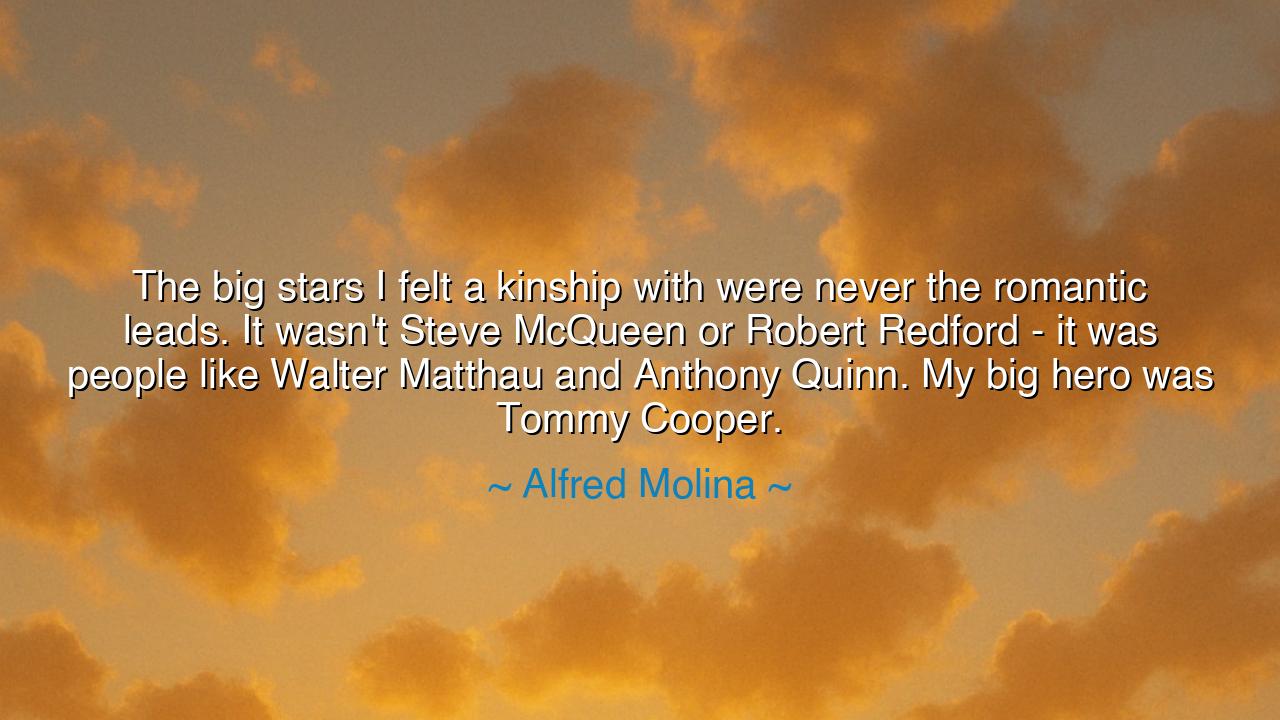
The big stars I felt a kinship with were never the romantic
The big stars I felt a kinship with were never the romantic leads. It wasn't Steve McQueen or Robert Redford - it was people like Walter Matthau and Anthony Quinn. My big hero was Tommy Cooper.






In the words of Alfred Molina, "The big stars I felt a kinship with were never the romantic leads. It wasn't Steve McQueen or Robert Redford - it was people like Walter Matthau and Anthony Quinn. My big hero was Tommy Cooper," we hear a deep reflection on the nature of heroism, the essence of appeal, and the power of authenticity in the world of fame and performance. Molina speaks not of the suave, idealized romantic heroes often seen in Hollywood, but of those who embodied realness and vulnerability in their performances. Matthau, Quinn, and Cooper were not the glamorous, unattainable figures often depicted as the epitome of masculine allure, but rather individuals whose charisma arose from their humanity, their flaws, and their grit. Molina’s identification with them speaks to a deeper, often unspoken truth: the most relatable heroes are those who embrace their imperfections, whose strength lies not in the roles they are cast in, but in the truth they bring to their performances.
In the ancient world, this idea was exemplified by the heroes of myth who, despite their great achievements, were never without flaws. Consider Hercules, the great hero of Greek mythology, who was revered for his strength, yet plagued by overwhelming challenges and moments of weakness. His labors were not just feats of physical prowess but journeys through suffering and self-discovery. The same can be said for Achilles, whose rage and pride often clouded his judgment, making him a tragic hero. These figures were heroes not because they were perfect or romantic, but because they fought through their imperfections, and their very struggles made them relatable and human. Similarly, the actors Molina admires—Matthau, Quinn, and Cooper—represent a type of heroism that speaks to our inner humanity rather than to an unattainable ideal.
The Romans too had a similar understanding of heroism, not rooted in unattainable perfection, but in virtue and resilience. Figures like Cicero and Caesar were admired not only for their strength and military prowess, but for their ability to confront their own flaws and failures. Cicero, in particular, was revered not for his outward strength, but for his courage in the face of political adversity and his ability to speak truth to power despite personal cost. The true Roman hero was one who endured and persisted, who was not defined by their idealized qualities but by their integrity and their capacity to overcome the challenges they faced. Molina’s admiration for actors like Walter Matthau and Tommy Cooper, who found their appeal through the rawness of their performances, reflects this same view of heroism—one rooted in resilience and authenticity rather than in polished, flawless presentation.
Tommy Cooper, whom Molina regards as his hero, was a figure who encapsulated this paradox. A comedian with an unmistakable charm, Cooper's humor was born not from perfect delivery but from his human imperfections, his self-deprecating nature, and his willingness to laugh at himself. His comedic genius lay in his awkwardness, his apparent failure to always hit the mark, which made his performances all the more endearing and relatable. Much like the ancient heroes, Cooper’s greatness came not from his flawlessness but from his ability to embrace his imperfections and transform them into strength. His humor was deeply human, and it is this vulnerability that made him such an iconic figure. Molina’s admiration for Cooper speaks to a broader truth: that true greatness is not about the perfect, but about embracing the imperfections and using them to connect with others on a deep, authentic level.
In the world of acting, romantic leads are often seen as the epitome of what it means to be a star—handsome, charming, and seemingly perfect. But Molina challenges this ideal. He finds kinship with actors like Matthau and Quinn, whose charm was not based on idealized perfection but on the realness they brought to their roles. Matthau, known for his gruff yet lovable characters, embodied a type of masculinity that was both strong and vulnerable. Quinn, likewise, brought depth to his roles, capturing both the strength and the humanity of his characters, especially in films where he portrayed complex, often flawed individuals. This speaks to a deeper lesson about the kind of strength that is truly admirable—not the strength that is perfect, but the strength that is honest, vulnerable, and unafraid of exposing flaws.
The lesson Molina offers is one of embracing authenticity and vulnerability in both life and in love. Heroes are not made by their perfection, but by their ability to accept and navigate their imperfections. Just as ancient myths reveal the human struggles and growth of their heroes, so too can we find strength in embracing our own flaws. True greatness lies not in conforming to an ideal but in being genuine, in showing the world that it is okay to fail, to struggle, and to be vulnerable. Like the actors Molina admires, we can all find kinship in those who live their lives with authenticity—who are not afraid to show their true selves, flaws and all, and who find strength in the courage to be real.
In your own life, seek to find strength in your own vulnerabilities. Recognize that greatness is not about perfection, but about embracing authenticity and learning from your mistakes. In love, in work, and in life, be the person who is willing to show up imperfect, who is not afraid to expose your flaws, and who uses them to connect with others on a deeper level. Like Molina, like Matthau, like Quinn, seek the strength of the authentic self, and know that it is in our imperfections that we find our true power.






AAdministratorAdministrator
Welcome, honored guests. Please leave a comment, we will respond soon